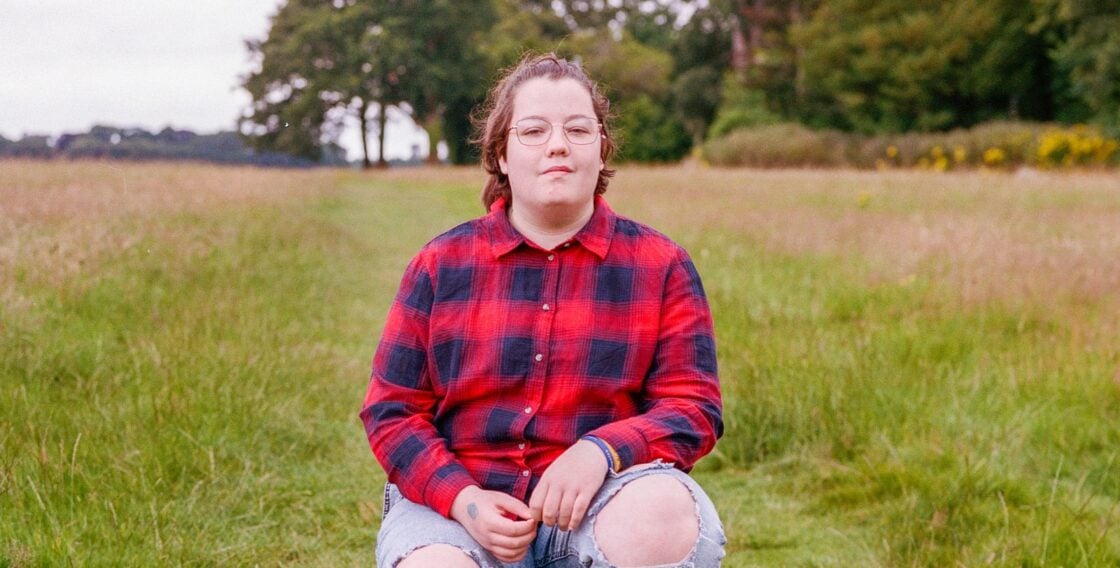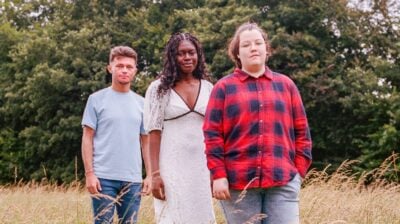Navigating my gender identity and religion
Hunter shares their journey of discovering their gender fluid identity and finding acceptance within their Catholic family.

For a long time, I struggled to find the right words to describe who I was. Initially, I thought I might identify as a boy, but that label never felt quite right. Eventually, I realised I was gender fluid. Gender fluid means not having a constant or fixed gender identity and/or gender expression.
Listen to Hunter’s story
Finding my gender identity
Understanding I was gender fluid came through simple, everyday experiences, like choosing an outfit. Some days, I’d be drawn to something that felt right, regardless of whether it was traditionally masculine or feminine. It was this fluidity in expression that helped me understand my true self.
Having multiple identities means freedom to me. It allows me to express myself in various ways, whether through my pronouns, he/they, or my choice of clothing. I typically wear jeans, tracksuit bottoms, or cargos, but the important thing is that I wear what feels right to me.
“You deserve to be in spaces where you are appreciated and accepted. If you’re not being valued, step away and prioritise your well-being.”
Growing up in a Catholic household
Growing up in a very Catholic household, I was initially scared to come out, fearing backlash and rejection. The first person I confided in was my sister. I knew she would be supportive and non-judgmental.
Four years ago, I came out to her, and a year or two later, I told my mom for the first time. She didn’t fully understand at first, but she accepted me. About two or three months ago, I came out to her again, and now she not only uses my pronouns but has also joined me at Pride events. Her support has been incredible.
Building confidence through family support
Coming out to my family significantly boosted my confidence. Before, I felt I couldn’t be open with anyone. Now, I proudly use my chosen name, Hunter, everywhere.
However, there were times when my identities clashed, especially during my early years when I was figuring out who I was. The rigid gender norms I was taught clashed with my fluid sense of self, causing a lot of internal conflict.
Religion and gender identity
Raised Catholic, I was taught that there were “only two genders: male and female”. This binary view made me fearful of revealing my true self. It took questioning both my religion and my identity to start understanding who I was.
Although religion initially made things difficult, it also played a role in my journey to self-discovery. I still hold onto some aspects of my religious upbringing. I believe in a higher power and sometimes pray for strength or guidance, though not as frequently as when I was a child.
It’s a common misconception that queer people don’t have spirituality, but for many of us, belief in something greater can be a source of strength and hope.
“Having multiple identities means freedom to me. It allows me to express myself in various ways, whether through my pronouns, he/they, or my choice of clothing.”
Expressing gender identity in daily life
Expressing my gender identity was challenging, but having my sister’s support made a huge difference. She encouraged me to talk to my mom, and I’m so grateful for her help. I know not everyone has such a support system, which makes it even harder for those in religious households to come out.
During my time in a Catholic school, I worked hard with a teacher to establish an LGBTQAI+ club. It took two years of persistence, but we eventually created a space where we could celebrate our identities. This experience showed me the importance of having supportive communities and allies.
Celebrating identity through pride
To celebrate my identity, I attend Pride events and other activities with my family. Recently, my mom and sister joined me at a drag show for the first time. It was amazing to share that experience with them.
Overcoming my internalised shame and fear due to the belief that being LGBTQAI+ was sinful required open conversations with my mom to understand her views on Pride and LGBTQAI+ issues. Her acceptance gave me the courage to fully come out to her.
Supporting the LGBTQAI+ community
My journey has shaped how I see the LGBTQAI+ community. I often find myself supporting friends who are also navigating their gender identities. It saddens me that some have no one else to talk to, highlighting the need for more support for LGBTQAI+ young people.
For anyone growing up in a religious household and struggling with their identity, my advice is to seek support, whether from a close friend, family member, or youth services.
Test the waters before coming out, especially if you’re unsure of how someone might react. Watch a queer film together or casually discuss LGBTQAI+ topics to try and figure out their openness. And most importantly, don’t feel pressured to come out until you’re ready.
“Coming out to my family significantly boosted my confidence. Before, I felt I couldn’t be open with anyone. Now, I proudly use my chosen name, Hunter, everywhere.”
Hope for a more understanding world
Looking forward, I hope for a world with greater understanding and acceptance of diverse identities. People should respect others’ happiness and refrain from judgment.
Misgendering can be hurtful, so I wish for more awareness and sensitivity around gender identity. I hope sharing my journey inspires more understanding and support for everyone navigating their identities.
Photos by Niamh Barry.
LGBTQIA+_______: Intersections of Identity
Join us in celebrating the beauty of diverse identities through the lens of Niamh Barry. Meet Shane (he/him), Bel (she/they) and Hunter (he/they) as they share their amazing stories.
Intersectional identities mean recognising how different parts of a person’s identity, like gender, sexuality, and culture, combine to shape their unique experiences.
Check out the series and be inspired by the unique experiences within our community.
Feeling overwhelmed and want to talk to someone?
- Get anonymous support 24/7 with our text message support service
- Connect with a trained volunteer who will listen to you, and help you to move forward feeling better
- Whatsapp us now or free-text SPUNOUT to 50808 to begin.
- Find out more about our text message support service
If you are a customer of the 48 or An Post network or cannot get through using the ‘50808’ short code please text HELLO to 086 1800 280 (standard message rates may apply). Some smaller networks do not support short codes like ‘50808’.






